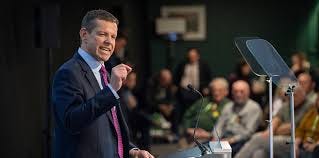What's up with Plaid Cymru?
Rhun’s Repositioning: Plaid Cymru’s Leader is seeking to profit from disappointment with the traditional parties; but will need to sharpen his narrative to be confident of being a kingmaker in 2026.
As Plaid Cymru gathers for its autumn conference delegates have both reason for celebration and cause for concern. The Party has returned four MPs at each general election since 2017 (having first managed the feat in 1992); but to have held steady despite the cut in numbers of Welsh MPs from 40 to 32 is still no small achievement. Twelve per cent of Wales’ MPs is a higher proportion than the ten per cent previous record and it was achieved despite aggressive mobilisation efforts by Welsh Labour in Carmarthenshire and Ynys Mon (Angelsey). Yet holding onto it’s heartland seats is hardly a breakthrough result in what was very much a change election..
Plaid’s spinners will point to the fact that their national share of the vote at 14.8 per cent also set a new record over their 14.3 per cent score achieved in 2001. This record level of support however remained below both the 18.2 per cent recorded by the Welsh Conservatives despite losing all the seats they were defending and, perhaps more worryingly, the 16.9 polled by Reform — a party that had no candidates in place at the outset of the election and stood no realistic shot at winning any specific seats.
Plaid’s Leader Rhun ap Iorwerth thus has cause to be satisfied with his first 15 months in the hot seat; but will be acutely conscious that he remains an awfully long way from emulating the success achieved by his fellow separatist party leaders John Swinney and Michelle O’Neill who occupy the first ministers office in Holyrood and Stormont respectively. He also knows that his Party is unforgiving of Leaders who fail to deliver the breakthroughs party activists (rather unreasonably) expect. He also knows that his predecessor Adam Price MS remains sore about his defenestration in May 2023 following a storm over allegations of widespread misogony within the Welsh nationalist movement and failure to deal sufficiently firmly with alleged misbehaviour by another Plaid MS (now suspended and barred from re-standing as a candidate). Dr Price comfortably beat ap Iorwerth at the last Leadership contest and is still reckoned a potential Mab Darogan by his fanbase inside the Party.
Ap Iorwerth has already ushered in a significant change of political direction by abrogating his predecessor’s ’co-operation agreement’ with Welsh Labour in the Senedd seven months earlier than originally agreed. This scuttled some elements of the joint legislative programme the to parties had agreed upon (reform of council tax bands & revaluation, changes to the school year and the Bill to require gender zipping of candidates at the 2026 Senedd elections being the main casualties) and catalysed the resignation of Vaughan Gething as First Minister / Prif Weinidog in July.
In his address to the conference ap-Iorwerth did not utter the word ‘independence’. Instead focusing on public services, promising a dedicated minister responsible for public health policy in the rather unlikely event of an outright Plaid Cymru majority in 2026. Whilst this certainly sounds interesting it’s worth recalling that by some way the most important single public health initiative in Wales since the introduction of compulsory seatbelt wearing in the 1980’s was the switch last year to a nationwide default urban speed limit of 20 mph. This change was part of the Labour/Plaid co-operation agreement negotiated and passed into law under Price; but over which ap-Iorwerth has been, to put it mildly, tepid in supporting since a driver outcry when implementation of the new limit began a year ago.
Pushed by his former colleagues in the Welsh political lobby (before becoming an MS in 2013 ap Iorwerth was chief political correspondent and presented various political journalism programmes for BBC Wales) on their eternal obsession with post-election deals and potential coalitions ap Iorwerth would say only that he “can’t see a scenario” in which his Party would strike a deal with the Conservatives or Reform UK. Notably he declined to rule out Labour in similar terms; it will be pretty difficult however for Labour to have confidence in an ap Iorwerth led Plaid Cymru as a reliable partner in the next Senedd in light of the disintegration of the co-operation agreement between them in this one; although if there’s no other choice they will take whatever support is on offer. There were no real indications as to what exactly (I anything) Plaid might demand in return for either another confidence and supply deal or a full coalition.
Plaid wants to be the positive alternative for voters tired of the two main parties and unenthused by the authoritarian and anglo-centric pitch of Reform. This is a crowded field these days though with the Lib Dems and Greens both buoyed by relative success in July also attempting to appeal to the same target pool. Plaid may also find themselves under some pressure in their fro-gymraeg heartland from the newish hard-right Welsh Nationalist Party, Gwlad. Although unlikely to win any seats themselves they may make it difficult for Plaid to pick-up a fourth seat in a super-constituency such as Bangor/YnysMon. Given that it will be quite a stretch for the Party to secure any MS at all in most of the six-member seats beyond the fro such spoiling could prove costly to ap Iorwerth’s hopes of becoming the indispensable kingmaker in the next Senedd as his predecessor on Ynys Mon, Ieuan Wyn Jones was able to be in 2007; negotiating both a rainbow coalition with the Tories and Lib Dems (ultimately scuppered by the LibDem’s Welsh national executive) and the ‘One Wales agreement with Rhodri Morgan. Such arithmetic may well come to pass; but it would not be wise to count on it—nor to assume that if it does Plaid would see any more benefit electorally than it did in 2011.



